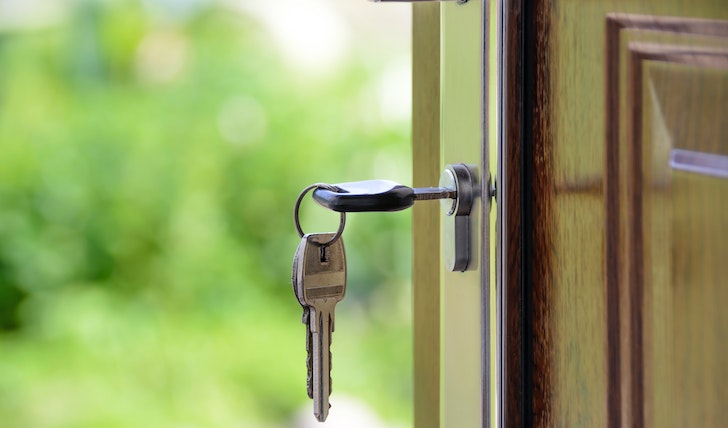
Everything You Need to Know About Mortgage Rate Lock

You have probably embarked on the exciting yet nerve-wracking voyage of purchasing a home. Amidst the sea of paperwork, open houses, and numerous coffee meetings with your realtor, you have probably come across the term “mortgage rate lock.” Let’s pause and dive deep into this topic.
No! It is not some medieval contraption to keep your home safe. But in some ways, it might be even more valuable.
What is a Mortgage Rate Lock?
Imagine you are shopping for the perfect pair of jeans. You find them on sale today, but who knows about tomorrow? A mortgage rate lock is akin to a store promising to honor today’s sale price, even if you decide to buy those jeans next week.

Yamin / Pexels / Mortgage Lock is one of the wisest financing techniques you can use to pay a minimum interest rate.
So, it is a lender’s promise to “lock in” a particular interest rate and a number of points for you for a specified period of time while your loan application is processed.
Why Should You Care?
Rates are a bit like the weather – constantly changing. A slight increase in interest rates might seem small, but over the life of a 30-year mortgage, even a 0.25% hike can cost you tens of thousands.
By locking in a rate, you are essentially putting on a raincoat, ready to face any storm of sudden rate increases.
What If Rates Go Down?
If rates drop significantly after you have locked in, you might feel like you missed out on a great party. Some lenders offer a “float down” option, which allows borrowers to get a lower rate if rates decrease during the lock period.

Photo Mix / Pexels / As the term suggests, mortgage lock means your lender promises to “lock in” the current interest rate (which is lower) for you to buy later on.
But, like most good things in life, it might come at a cost.
How Do You Lock in a Rate?
Typically, once you have chosen a house and are officially in the loan process, you can ask your lender to lock in your rate. Some might offer the option right after your initial loan application.
Make sure to get the rate lock in writing. A handshake or a “trust me” will not cut it in this realm.
Is There a Cost?
Here is where things get spicy. Some lenders offer rate locks for free, while others might charge a fee. Additionally, the longer the rate lock period, the higher the fee might be.

Pixabay / Pexels / Some lenders charge for mortgage lock, and others offer it for free. Typically, the fee depends on the period of the rate lock.
It is a bit like paying extra for a longer warranty on a gadget.
What Happens If You Don’t Close on Time?
Life happens. Delays pop up. If your loan does not get processed within your lock period, you might be in a pickle. Some lenders might extend the lock for free or for a fee.
And others might say, “Sorry, time is up!” And you will be at the mercy of the current rates.
When Should You Lock in Your Rate?
This one is a blend of science and art. Monitor the current market trends and consult with your lender or financial advisor. If rates are unusually low or you think they might rise before closing, locking in might be your best bet.
More in Pocket Change
-
`
Why You Need to Think Twice Before Buying a House
So, you have been scrolling through real estate listings, envisioning your dream kitchen, and even bookmarking paint colors for the nursery....
November 26, 2023 -
`
Santo Spirits: Sammy Hagar and Guy Fieri’s Joint Venture
In the world of business partnerships, some combinations might seem unconventional at first glance. But when you delve deeper into the...
November 16, 2023 -
`
7 Effective Ways to Make Your Business More Sustainable
In an age of rising environmental consciousness, making your business more sustainable isn’t just a trend; it’s a necessity. Sustainable practices...
November 3, 2023 -
`
Housing Market Going Up? Then Why Not Rent?
“Buy a house! It is the best investment!” How many times have you heard that? Probably enough to make a drinking...
October 29, 2023 -
`
Surprising! Celebs Who You Didn’t Know Had a Master’s Degree
When it comes to celebrities, we often associate them with glitz, glamour, and blockbuster movies. But did you know that some...
October 17, 2023 -
`
Navigating the Housing Maze: The 7% Mortgage Rate Quandary
If there is one thing that this year has thrown our way (apart from those fascinating tech gadgets we did not know...
October 12, 2023 -
`
Where to Buy a House in the U.S With a $100K Salary
Got a cool $100,000 annual paycheck in your pocket? Cheers to that accomplishment! With such a financial cushion, dreams of homeownership...
October 6, 2023 -
`
The “Grave” Housing Crisis Forcing U.S. Homeowners to Sell Their Houses
Every culture has its dreams and aspirations. For those living in the United States, it has traditionally been an idyllic house, spacious and...
October 1, 2023 -
`
Why Private Equity is Betting Big on Hollywood
Hollywood has long been a glamorous yet unpredictable industry. But what is new in Tinseltown? Private equity investments. Yes, that is right!...
September 19, 2023















You must be logged in to post a comment Login